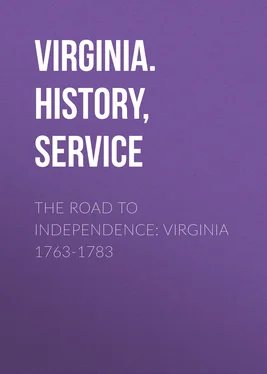Virginia. History, Government, and Geography - The Road to Independence - Virginia 1763-1783
Здесь есть возможность читать онлайн «Virginia. History, Government, and Geography - The Road to Independence - Virginia 1763-1783» — ознакомительный отрывок электронной книги совершенно бесплатно, а после прочтения отрывка купить полную версию. В некоторых случаях можно слушать аудио, скачать через торрент в формате fb2 и присутствует краткое содержание. Жанр: foreign_prose, История, foreign_edu, foreign_antique, на английском языке. Описание произведения, (предисловие) а так же отзывы посетителей доступны на портале библиотеки ЛибКат.
- Название:The Road to Independence: Virginia 1763-1783
- Автор:
- Жанр:
- Год:неизвестен
- ISBN:нет данных
- Рейтинг книги:4 / 5. Голосов: 1
-
Избранное:Добавить в избранное
- Отзывы:
-
Ваша оценка:
- 80
- 1
- 2
- 3
- 4
- 5
The Road to Independence: Virginia 1763-1783: краткое содержание, описание и аннотация
Предлагаем к чтению аннотацию, описание, краткое содержание или предисловие (зависит от того, что написал сам автор книги «The Road to Independence: Virginia 1763-1783»). Если вы не нашли необходимую информацию о книге — напишите в комментариях, мы постараемся отыскать её.
The Road to Independence: Virginia 1763-1783 — читать онлайн ознакомительный отрывок
Ниже представлен текст книги, разбитый по страницам. Система сохранения места последней прочитанной страницы, позволяет с удобством читать онлайн бесплатно книгу «The Road to Independence: Virginia 1763-1783», без необходимости каждый раз заново искать на чём Вы остановились. Поставьте закладку, и сможете в любой момент перейти на страницу, на которой закончили чтение.
Интервал:
Закладка:
At the heart of the Grenville program were his financial schemes. The program had three parts: 1) to strengthen and enforce existing Acts of Trade; 2) to ease inflation and stabilize colonial trade with a uniform currency act; and 3) to raise additional revenue by applying stamp taxes to the colonies. Even then Grenville expected to raise only about one-half the expenses the new empire required. The rest would have to come from British sources.
To close the loopholes in the Navigation Acts and make them profitable, Grenville submitted the American Revenue Act of 1764, popularly known as the Sugar Act. Although the sugar trade provisions were the most dramatic example of a redirection in the Navigation Acts, the American Revenue Act contained radical departures from past attitudes and practices. Heavy duties were applied to foreign goods allowed to enter the colonies directly, including white sugar, Madeira wine, and coffee. Many goods formerly allowed to enter the colonies directly were placed on the list of enumerated articles which must pass through England before being shipped to the colonies. The act, although slightly reducing the duty on French West Indian foreign molasses, contained strict provisions for its collection omitted from the laxly enforced Molasses Act of 1733. The British fleet was stationed along the American coast to assist the customs service in enforcing the act.
Parliament created a new vice-admiralty court to sit at Halifax without a jury as an alternative to the colonial vice-admiralty courts whose juries were notoriously biased against the customs officers and whose judges often were colonials engaged in illicit trade.
In the Sugar Act, Grenville and parliament took the existing Navigation Acts and reasserted parliamentary authority over imperial trade, reaffirmed the 17th Century colonial philosophy that the colonies existed to promote the welfare of the mother country and the empire, granted trade monopolies to British merchants and manufacturers where none existed before, and discriminated in favor of one set of colonies, the British West Indies, and against another set, the North American colonies. To this was added a new principle—the Navigation Acts should not only regulate trade, they should produce revenue. Cleverly designed within the constitutional system, the Sugar Act brought howls of protests from New England and Middle Colony traders, smugglers and legitimate operators alike, who had flourished under the benevolence of "salutary neglect" for the past half-century. For many Americans the new act with its favoritism to British and West Indian merchants, its use of the navy as law enforcer, and the founding of a vice-admiralty court in Nova Scotia with jurisdiction over all America was an abuse of parliament's power. As events developed the Sugar Act was a failure. The old act designed for regulatory purposes, cost approximately three times as much to enforce as the revenues collected; the new act, expected to produce annual revenues of about £100,000, averaged about £20,000 in revenues at an annual cost of over £200,000.
Virginians, only indirectly effected by the Sugar Act, were deeply effected by the second part of the Grenville program—the Currency Act of 1764. During the French and Indian War Virginia had printed several paper money issues to finance the war and provide currency in the specie-short colony. The various issues, eventually totaling over £500,000, circulated for a fixed number of years and then were to be redeemed upon presentation to the treasurer, Speaker John Robinson. As the war lengthened and the number of paper money issues increased, considerable confusion developed over the amount of money outstanding, the rate of exchange, and its use as legal tender for personal debts as well as public taxes. Although backed by the "good will" of the General Assembly, this money (called "current money") was discounted when used to pay debts contracted in pounds sterling. Although the official exchange rate set by the assembly was £125, Virginia current money equalled £130-£165 per £100 sterling, averaging £155-£160 in 1763 and early 1764. The citizens were compelled by law to accept inflated Virginia paper currency as legal tender for debts which they had contracted in pounds sterling. The fiscal problems were most critical in Virginia, but they also existed in most colonies outside New England whose colonies parliament restricted under a currency act in 1751. In response to pleas from London merchants, Grenville devised and parliament passed the Currency Act of 1764, prohibiting the issuing of any more paper money and commanding all money in circulation to be called in and redeemed.
The result in Virginia was sheer consternation, especially among the hard-pressed Tidewater planters. In the process of calling in the money a severe currency shortage developed and some financial hardship occurred at the same time the Stamp Act took effect. More significant than the economic impact was the political impact of the Currency Act on Virginia politics and the political fortunes of key Virginians. Among the many Virginians caught up in the Currency Act none was more involved than Speaker John Robinson. At his death in May 1766 an audit revealed massive shortages in his treasurer's account books resulting from heavy loans to many Tidewater gentry and political associates. The Robinson scandal brought about a redistribution of political leadership in Virginia and brought into the leadership circle the Northern Neck and Piedmont planters who formerly were excluded. 12 12 For a favorable and convincing view of Virginia's motives in passing the paper money bills, see Joseph Ernst, "Genesis of the Currency Act of 1764, Virginia Paper Money and the Protection of British Investments", William and Mary Quarterly , 3rd ser., XXII, 3-32, and "The Robinson Scandal Redivius", Virginia Magazine of History and Biography , LXXVII, 146-173. Ernst is critical of Robinson's political use of the funds. For a more charitable view of Robinson's actions, see the outstanding biography by David Mays, Edmund Pendleton 1721-1803 (Harvard Press, 1952), 2 vols. Pendleton was the executor of the Robinson estate.
The third facet of the Grenville revenue plan was the infamous Stamp Act. Grenville and his aides perceived the tax bill as a routine piece of legislation which would extend to the colonies a tax long used in Britain. Grenville announced in March 1764 the ministry's intention to present to the commons a stamp tax bill at the February 1765 session of parliament. He "hoped that the power and sovereignty of parliament, over every part of the British dominions, for the purpose of raising or collecting any tax, would not be disputed. That if there was a single man doubted it, he would take the sense of the House...." As another observer put it, "Mr. Grenville strongly urg'd not only the power but the right of parliament to tax the colonys and hop'd in Gods Name as his Expression was that none would dare dispute their Sovereignty." 13 13 Both quotes cited in Edmund and Helen Morgan, The Stamp Act Crisis paperback edition (Collier Books: New York, 1962), 76. This is the standard work on the Stamp Act.
The House of Commons, as quick as the Virginia House of Burgesses to proclaim its sovereignty rose to Grenville's bait and declared in a resolution of March 17, 1764 that "toward defending, protecting, and securing the British colonies and Plantations in America, it may be proper to charge certain Stamp Duties in the said Colonies and Plantations...." In that simple phrase parliament declared its full sovereignty over the colonies and from it never retreated.
That Grenville might have hoped that the "power and sovereignty of Parliament … would not be disputed" suggests the degree to which he did not comprehend 18th Century colonial constitutional developments. Virginia reaction was immediate, clear, unequivocal, and illustrative of just how deeply ingrained were Virginia's constitutional positions about the limits of parliamentary authority. In 1759 the General Assembly had elected a joint committee to correspond regularly with its London agent and to instruct him on matters of policy and legislation pending in England. This committee was meeting on July 28, 1764, in Williamsburg drafting instructions to agent Edward Montagu on the Sugar Act when word arrived from Montagu about the commons resolution. The Committee of Correspondence's reply was instantaneous:
Читать дальшеИнтервал:
Закладка:
Похожие книги на «The Road to Independence: Virginia 1763-1783»
Представляем Вашему вниманию похожие книги на «The Road to Independence: Virginia 1763-1783» списком для выбора. Мы отобрали схожую по названию и смыслу литературу в надежде предоставить читателям больше вариантов отыскать новые, интересные, ещё непрочитанные произведения.
Обсуждение, отзывы о книге «The Road to Independence: Virginia 1763-1783» и просто собственные мнения читателей. Оставьте ваши комментарии, напишите, что Вы думаете о произведении, его смысле или главных героях. Укажите что конкретно понравилось, а что нет, и почему Вы так считаете.












